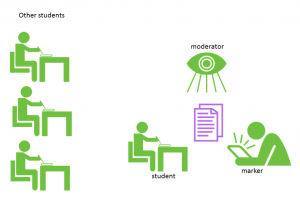Over the last 2 days, we’ve looked at the typical type of assessment, in that the only audience for the work are the marker and the moderator. However, in most workplaces, there’s an expectation that a wide range of people will see individuals outputs, whatever they are. In some subjects, this is already done extensively; many have peer audiences for presentations, creative arts often have critiques in which the whole group participates, but for written work, it’s far less common to allow others to see the outputs.

While we could use a tool such as OneDrive to allow students to read others’ work, the process of having to download, open and then read, can be daunting.
So what about a wiki? Each student can have a page, but it’s easy to see (and link to) others pages. We have some staff on campus who are already using this with the CampusPack tool in My Dundee, and it’s ongoing, so students can see work from both their own class, and previous classes. It would also be possible, with the CampusPress pilot we currently have, to not only allow the students on the module to see the wiki, but you could, should you choose, allow the whole University, or even the world to see the students work. Clearly, allowing work to be visible outside the university can be daunting for some students and staff, but it can also be an important aspect of enhancing their digital literacy and competencies.
While a CampusPress blog would allow others to see, they may well not find it, so, how about the idea of getting students to update Wikipedia?
Clearly, working with Wikipedia articles requires a lot of support to help the students develop best practice – Wikipedia has a page of useful pointers, including various examples from Law, Latin American studies, and others.
Useful reading.
Farzan, R., & Kraut, R. E. (2013). Wikipedia classroom experiment: bidirectional benefits of students’ engagement in online production communities. In Proceedings of the SIGCHI Conference on Human Factors in Computing Systems (pp. 783–792). Paris, France: ACM.


In my Level 3 African history module I use the wiki tool as a form of assessment, and it has worked really well over the last few years as a means for getting students engaged with their studies. The aim of the Wiki project is to create a fully useable and referencable database on a broad range of issues relating to Africa’s History, Politics, Culture, or Society, which can then be utilised by everyone on the module. A range of topics that have been covered by previous year groups include: The African Image; France’s collective amnesia in Algeria; South African Protest Theatre; #Kony2012, Gender Equality; Political power and cultural expression in Zaire; Mobile Banking; or Algerian Football Revolutionaries. The wiki gives the students freedom to pick a topic and then carry out research on it, hence why there is a diverse set of entries. Furthermore, it gives my humanities students an opportunity to develop their IT / digital literacy skills in terms of editing and designing their wiki pages. I highly recommend it as a means of generating student engagement.
It’s good to hear how well your students have taken to this, how do you they would feel about sharing it on Wikipedia with the whole world?
I think it would need to be carefully explained the purpose of why they were doing it for a global audience. There is definitely reticence to being so ‘exposed’ in such a public way, and I think they’d need some persuading to do so. However, the original premise when I set up the wiki project was, at some undefined future point, to make it public. It is something that I am still considering